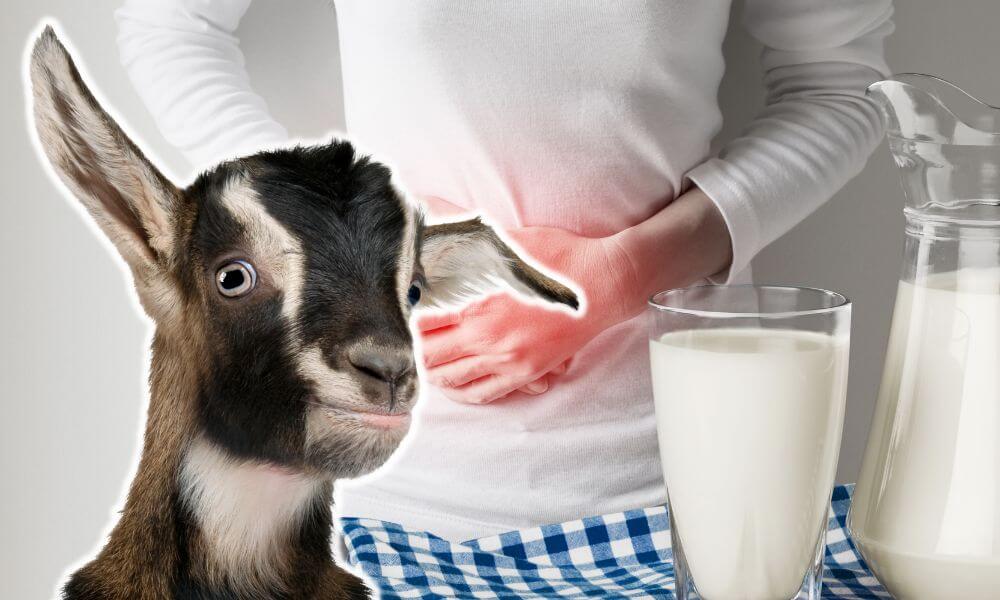I stopped using products containing lactose some years ago, when I finally had to admit to myself that they weren’t good for me and I was probably lactose intolerant, no matter how much I loved cheese.
I’d always used cow’s milk and other dairy products made from cow’s milk.
I recently decided to start rearing goats on my homestead, though, and I was intrigued by goat’s milk as a potential alternative.
My first question was about one of the single biggest issues people have with lactose intolerance.
So, I looked into it.
Can goat’s milk cause constipation?
Goat’s milk can cause constipation, but usually for the same reasons that other lactose containing products would. The main reasons milk causes constipation is because people with lactose intolerance lack the enzyme which breaks down this special sugar. Whether it’s lactose from goat’s milk or cow’s milk, the same problem remains.
So, if other lactose-containing products don’t cause you any problems, you’re unlikely to have trouble with constipation from goat’s milk especially.
However, if you were thinking it may be a healthier alternative to cow’s milk, it, unfortunately, will not be.
So, let’s look at what exactly causes these issues, and if there’s anything to be done that doesn’t mean sacrificing milk in your diet.

What causes constipation from milk?
The main reason that milk causes constipation is the presence of lactose.
Lactose is a type of sugar present in milk (and thus also in any dairy product) that many humans lack the enzyme necessary to break down.
Indeed, most mammals do not possess this enzyme except in their juvenile state in order to be able to break down their mother’s milk.
Once they mature, they lose the enzyme.
As bacteria in the colon ferment the undigested lactose, methane gas is produced as a waste product which slows down digestion causing constipation.
Humans who are lactose intolerant suffer constipation because the enzymes build up in your gut and you are unable to pass it.
They haven’t been sufficiently digested.
There are other factors involved—indeed, cow’s milk does seem to contain some proteins that increase the risk of constipation.
The main factor is usually lactose, however.
Goat’s milk may contain marginally less lactose than cow’s milk, and the amount that people can tolerate does vary, but ultimately if you have an adverse reaction to lactose, goat’s milk will not agree with you.
Dairy products have been a staple of human diets for thousands of years, so we clearly do possess some faculty to break down lactose in ways that other animals can’t.
For most people, however, they may only be mildly lactose intolerant, such that they never really notice any adverse effects. As I said, the amount of lactose that people can tolerate varies.
Which milk is good for constipation?
Now, if you have your own milking goats on your homestead, a lot of natural health practitioners do argue that raw milk (that is, unpasteurized) is better for your digestion and is less likely to cause constipation.
If you have your own goats to milk, you could try some raw milk without pasteurizing and see how you react.
However, as far as their chemical makeup goes, raw milk and processed milk contain the same amount of lactose.
That is not to say that there could not be some part of the pasteurization process which worsens the problem of constipation, but ultimately the main culprit remains in the same concentrations.
Since all mammals produce milk for the same reason (feeding their young), any milk from an animal will contain lactose.
Like I said, there currently isn’t much way around the fact that lactose is the problem and it’s present in all milk.
Consider plant-based alternatives, like soya milk, oat milk or almond milk.
They are tasty and serve almost all the same functions as ordinary cow’s or goat’s milk.
Can goat’s milk formula cause constipation?
As I mentioned earlier, there are factors at work beyond the lactose.
Another popular use of goat’s milk has been as formula for babies.
Some parents have observed that cow’s milk formula cause a number of problems for their babies, including bloating, wind and, of course, constipation.
There is a protein present in both cow’s and goat’s milk known as A1 casein protein.
Many adults are intolerant to this protein, also, and goat’s milk actually contains less than half the concentration of this protein as compared with cow’s milk.
However, goat’s milk is not recommended for infants for a few reasons.
Indeed, it can still cause a lot of the same problems as cow’s milk, like intestinal irritation and even anemia.
Goat’s milk also lacks a lot of the vitamins and minerals that are vital to the health of a growing baby.
Goat’s milk doesn’t have enough iron or folate, enough of Vitamins C, D and B6, thiamin, niacin and pantothenic acid for a growing infant.
There isn’t really a suitable substitute for baby formula.
Goat’s milk may seem to pose less danger than cow’s milk formula, but ultimately it lacks the nutritional value to make it matter.
Goat’s milk, then, is in some ways better for you than cow’s milk, and there are ways you can drink it that mitigate some of the effects.
Ultimately, though, lactose intolerance is the main culprit in the problem, and there isn’t much you can do to mitigate that without excluding lactose from your diet.
There are plenty of tasty, healthy alternatives to goat’s milk, though, so you need not worry.
There will be a milk out there for you that doesn’t cause constipation.
